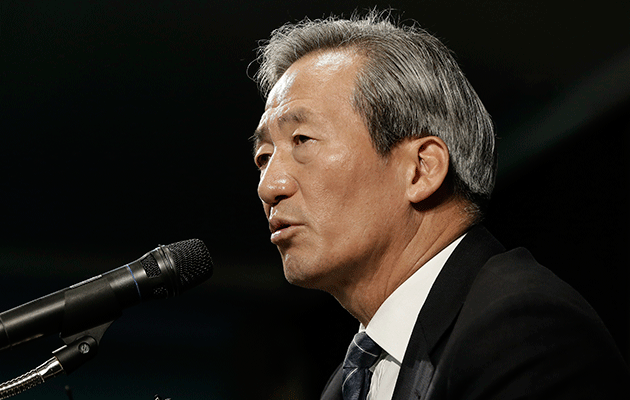Chung Mong-joon’s FIFA presidential campaign could be over almost as soon as it has begun.
Unconfirmed reports suggest that the South Korean billionaire risks a ban of up to 15 years from all football activity because of his ‘persuasive’ efforts in support of his country’s vain bid to host the 2022 World Cup finals.
These come less than a week after the 63-year-old launched in Paris his bid to secure the presidency of the world football federation. Incumbent Sepp Blatter is standing down with a successor to be elected in Zurich next February 26.
Chung had complained, at his campaign launch, of a culture of corruption at the head of the international game’s administration. Blatter quickly hit back verbally and Chung then came under further pressure after a report in Germany that he risks heavy punishment from FIFA’s ethics system.
German ethics chairman Hans-Joachim Eckert is still studying results of the inquiry into the awards of the 2018 and 2022 World Cups to Russia and Qatar. The investigation was undertaken by now-departed American attorney Michael Garcia and is been maintained by Swiss lawyer Cornel Borbely.
According to the German newspaper Welt am Sonntag Borbely has recommended a 15-year suspension for Chung who was FIFA’s Asian president for 17 years until being ousted by Prince Ali of Jordan in 2011.
The newspaper claimed that, ahead of the World Cup votes in December 2010, Chung wrote to his colleagues on the FIFA executive committee about a proposed global football fund. The Koreans were offering $777m on development projects around the world on condition that the country was successful in obtaining the World Cup.
Further, Welt am Sonntag claimed Chung appealed to Blatter to halt the investigation but the Swiss refused to become involved.
Also last week it emerged that FIFA’s ethics committee was investigating donations made by Chung, whose family controls Hyundai, for donations in 2010 to help Haiti after a earthquake and Pakistan after flooding.
Chung has responded angrily to the latest allegations which threaten his pursuit of the presidency for which UEFA’s French president Michel Platini is currently the only other heavyweight candidate.
A statement from Chung’s office blamed Blatter’s antagonism, saying: “This is yet another clear proof that president Blatter is interfering in the upcoming FIFA presidential election. FIFA is engaged in a self-defeating attempt to sabotage Dr Chung’s candidacy.”
Blatter, enjoying his annual ‘home’ event in Valais on Saturday, refused to comment on the race for his succession.
The two men were never the best of friends with the South Korean increasingly irritating Blatter during his exco tenure with questions about FIFA finances including the president’s remuneration package.
Chung also supported the attempt by UEFA, in the 1990s, to impose major change on FIFA’s commercial operations through its Vision I and Vision II proposals. That all fell through after Blatter beat UEFA leader Lennart Johansson to win the FIFA presidency in 1998.
Four years later Japan and South Korea co-hosted the 2002 World Cup amid financial turmoil after the scandal-racked collapse of commercial partner ISL.
FIFA’s reputation was further tarnished by the controversy over the 2018 and 2022 World Cups awards.
The executive committee’s vote, in December 2010, was followed by further scandal in the run-up to Blatter’s re-election as president the following year.
A first attempt at reform was only partially effective. A strengthened ethics arm saw the suspensions and departures of a number of senior exco figures before seven FIFA-linked senior football and commercial figures were arrested in Zurich on a US Justice Department indictment on May 27.
Two days later Blatter was re-elected as president but then stood down under the weight of controversy with the Swiss judicial authorities launching their own inquiry into the awards of the 2018 and 2022 World Cups and assisting the USDoJ in relation to suspected banking transactions.







